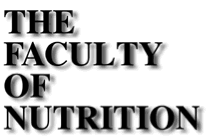 |
 |
A Science of Health Based on the Needs of the Times
The science of nutrition was once considered to be mainly concerned with remedying health disorders caused by nutritional inadequacies or imbalances. In
modern times there is a need for education and research on medical aspects, such as health management, to cope with the rise in the percentage of elderly persons in society, in addition to adult diseases and
nutritional disorders caused by overeating or an unbalanced diet.
Nutrition has assumed a place as a third medical discipline, “Health Promotion,” alongside the traditional fields of treatment of disease and
preventive medicine. It is an area of study that is sure to become more prominent in the years ahead. As the emphasis on health becomes more pronounced all over the world, it is becoming clear that there are a
surprising number of unknown and undiscovered areas in the scientific and medical study of nutrition. There is a real need for young, enthusiastic researchers to carry on work in these areas.
The science of nutrition is a wide-ranging scholarly discipline that embraces many fields, such as agriculture, pharmacy, domestic science, health
science, and medicine, which have traditionally been concerned with human health. The Faculty of Nutrition recognizes the importance that this field will assume in the 21st century. The Faculty of Nutrition was
established in 1966 as the first coeducational 4-year program of its kind in Japan.
The teaching program of the Faculty of Nutrition includes a thorough study of basic knowledge in the field, backed up by extensive hands-on experience and
testing. Qualified nutritionists (dieticians) are very highly regarded as skilled, promising professionals.
Those who successfully complete the program, and graduate as management nutritionists, acquire a qualification which is fully recognized by national standards. The law requires that nutritionists
employed in hospitals and similar institutions possess this qualification, and its importance is increasing steadily. Graduates of the program are in fact in great demand. Many go on to careers in food- and
drug-related industries, in hospitals, in food service companies or in the public service sector.
The well-balanced curriculum covers the two main areas of nutritional science. The first is the study of food up to the point at which it is consumed.
This includes food production, analysis, processing and preparation. The second area is concerned with what happens after the consumption of food and drink. This includes the study of digestion and absorption,
the effect on metabolism of different nutrients, and how the nutrients are used by the body, their relationships with disease, etc.
The Faculty of Nutrition runs a comprehensive program of research and education covering food both before and after it is taken into the body. Areas which
are generally omitted from the study of medicine and agriculture are thoroughly covered. Our nutritional research is designed to work in strong partnership with studies in the medical field. In the fourth year,
students undertake a program of graduate research. The experience they gain through this full year spent on a single aspect of research stands them in good stead for their future professional activities.
The Faculty of Nutrition comprises the following eight laboratories;
Nutritional Physiology, Nutritional Chemistry, Nutritional Pathology, Nutritional Administration, Food Chemistry, Food Nutrition, Public Health and
Physiology.